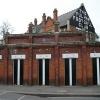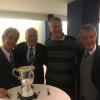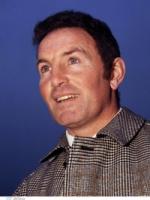Dave Sexton — A True Visionary
Thursday, 29th Nov 2012 19:44 by Roller
Following the passing of arguably QPR’s greatest ever manager, Dave Sexton, at the weekend, guest columnist Roller remembers the great man.
Those of us lucky enough to watch the finest ever QPR team will always have our own personal cherished memories of 1975/76 season, but I’m sure that we can all vividly recall the brilliant goal finished by Gerry Francis at Loftus Road against Liverpool in our opening match of that season’s campaign. From the moment goal keeper Phil Parkes rolled the ball out no Liverpool player ever got close to it. The precise, one-touch move culminated with Francis collecting Stan Bowles’ clever back heel, executing an immaculate one – two with Don Givens which pierced the heart of Liverpool’s defence before planting his shot into the far corner of the goal. It was a move that was as ruthless as it was beautiful and it perfectly set the scene for the season ahead. The Loftus Road faithful in particular, along with the wider football viewing public in general, were served up treat after treat throughout the season.
Sadly the visionary behind this magnificent team died at the weekend. Dave Sexton was decades ahead of his time as a coach. At every possible opportunity he would go and watch matches in Europe returning with new ideas to put into practice with his ever willing players at QPR giving rise to a team that would have graced the Dutch league that he so admired. He managed to infuse the skill and technique that is a hallmark of the Dutch game into the work ethic and determination that typified the best English teams of those times. QPR’s passing and movement was unparalleled in the English league and wouldn’t been seen again until foreign coaches started to permeate into English football.
Despite having guided Chelsea to their first ever FA Cup victory and swiftly following that success up with European triumph in the Cup Winners’ Cup, Dave Sexton was sacked in early October 1974. The side had started to struggle and several major names had been sold after falling out with their manager. He very quickly walked into that role at QPR following the departure of Gordon Jago. Having only been promoted to the 1st Division at the end of the 1977/73 season, QPR were still trying to establish themselves in the top flight, a task had been made more difficult by the departure of their lynch pin Terry Venables. The midfield general had left to pursue his fledgling coaching career under Malcolm Allison at Crystal Palace. I can only wonder as to how good a coach Venables would have become had he stayed at QPR for a couple of seasons and gained more experience under Sexton.
Sexton was the first to admit that he inherited a very good team from Jago and he quickly surmised that this group of players were perfect for him to realise his vision of how football should be played. Every player was comfortable with the ball at his feet, every player had good technique, every player had a good attitude. Having identified the man he wanted to replace Venables and had no qualms in backing his judgment. He plucked Don Masson from the lower leagues even though he was already almost 29 years old and had no top flight experience. Far from letting him down, Masson provided Sexton with exactly what he expected as he prompted the team unveiling a magnificent range of passing and became the perfect foil to the dynamic attacking prowess of Francis.
Sexton patiently developed his plans throughout the remainder of the 1974/75 season, slowly introducing his ideas to the players. Their passing was sharpened, their movement enhanced and awareness of space heightened. New coaching drills and tactics from Sexton’s frequent trips to Europe were frequently added to the teams repertoire as Sexton’s interpretation of “total football” was developed; the players willingly embracing their coach’s philosophy. In the close season Sexton signed experienced utility midfielder John Hollins from relegated Chelsea where he was deemed to be too old at only 29.
The 1975/76 season will forever be remembered in QPR folklore as the greatest, but possibly most heartbreaking, season of them all. Rangers played the most entertaining style of football ever seen at Loftus Road. QPR’s free flowing style was at times breathtaking as the players revelled in roles that Sexton allotted them. Liverpool were swept aside on that season’s opening day, reigning champions Derby County humiliated on their own ground and Everton destroyed at Loftus Road. A tough winter on heavier pitches cost the team badly, but, just as they were being written off, they launched onto a magnificent run of 14 wins from 17 matches. Rangers sat proudly on top of the table after their last match of the season but had to wait 10 days for Liverpool to complete their fixtures. I’m sure that I wasn’t alone in crying myself to sleep as Liverpool recovered in the last 15 minutes of their final match to eventually beat Wolves 3 – 1 and steal our title.
Sexton’s side didn’t really ever recover from that shattering experience. Their league form was patchy and a promising U.E.F.A. cup campaign heartbreakingly ended in a penalty shootout defeat in Athens. Sexton was in demand at the end of the season and left to take over from Tommy Docherty at Manchester United having initially been linked with Arsenal. His assistant Frank Sibley took over but that time had gone. The team slowly broke up but left an indelible impression on anyone who witnessed them in full flow.
Dave Sexton is always included in any discussion between QPR supporters regarding our greatest ever manager, along with Alec Stock and Terry Venables. His philosophy about how football should be played was incomparable and his QPR side of the 1975/76 must be regarded as his crowning achievement. In that one season he elevated QPR into everybody’s second team, the one side that football lovers all around the country would rush home early from the pub on Saturday nights to watch if they were on Match of the Day. We’ve had some great side to watch at Loftus Road since those days, but none that truly stand comparison with that team. Dave Sexton’s vision, coaching and tactics gave us the greatest team we have ever had the privilege to support.
Thank you Dave, may you rest in peace.
 Visit the RollercoasterRanger blog by clicking on the banner above for more of Roller's thoughts on all things QPR. Visit the RollercoasterRanger blog by clicking on the banner above for more of Roller's thoughts on all things QPR.
Tweet @RollerRanger, @loftforwords
Pictures – Action Images
Photo: Action Images
Please report offensive, libellous or inappropriate posts by using the links provided.
AgedR added 20:42 - Nov 29
Thank you Roller. I'm slightly ashamed to admit, my Grandad was a bit of a club hopper. Brentford and, yes, the other lot. Sexton's team got him down to Rangers and he brought me with him a few years after when TV was casting his wonderful spell. The rest, for me, is history.
Thanks Grandad, for finally seeing sense (he never hopped from us).
And thank you Dave Sexton, for allowing me to have this wondeful hooped love affair. |  | |
radfords added 21:35 - Nov 29
Excellent article about the man who produced the team that played the best football I have ever seen in W12.
Masson was a key element of the team who often gets overlooked. The movement of the whole team was brilliant - giving constant options to the player on the ball. This is not innovative but has proved beyond so many of our teams ever since. |  | |
QPRski added 21:49 - Nov 29
Roller, Great report.It is difficult to add anything more.
I fell in "love" with QPR during this period, and now realise that this man was the mastermind of the drama and my "idols" were only secondary actors.
Thank you Dave Sexton. R.I.P
|  | |
isawqpratwcity added 04:53 - Nov 30
"At every possible opportunity he would go and watch matches in Europe returning with new ideas to put into practice with his ever willing players at QPR giving rise to a team that would have graced the Dutch league that he so admired. He managed to infuse the skill and technique that is a hallmark of the Dutch game into the work ethic and determination that typified the best English teams of those times. QPR’s passing and movement was unparalleled in the English league and wouldn’t been seen again until foreign coaches started to permeate into English football."
God, they must have been exciting times! RIP |  | |
shooters47 added 08:08 - Nov 30
Roller, thank you for the fine tribute. The best performance I have ever witnessed was Derby away that season. Stan was unplayable. Remember telling my Mum, as I was only 12, I was popping down to the shops and may be a while then went to St Pancras and got on the special!!! Fanatastic times.
Dave Sexton RIP. |  | |
Konk added 08:42 - Nov 30
Really nice piece. I've heard a lot about that Rangers side over the years - must have been a very special time for your club. |  | |
themodfather added 09:53 - Nov 30
a loss to the game of football as a whole....RIP. |  | |
probbo added 10:26 - Nov 30
An excellent report Clive, thanks. The first season my dad took me to see the R's was 1975/6 (I was eight). We'd tried to get in to the Spurs match the previous season but it was a sell out and we'd not pre-booked tickets so after that experience my dad always reserved.
The first game I saw was that curtain raiser against Liverpool, sat in the South Africa Road paddock at £2 per ticket! The old 'Loft' was packed to the rafters and looked massive, as was the open away end - 27k was the attendance from memory. Gerry Francis's goal was (if I recall) Match of the Day's goal of the season - what an amazing season it was and what a team. As I played left wing at school I idolised Dave Thomas, socks round his ankles and no shin pads to be seen. To think if we'd beaten Norwich in the run in we'd have won the title but it wasn't to be. I'd love to know how many players we used that season becuase (aside from the odd cameo by Busby and Abbot) we seemed to have the same starting 11 every match!
It was a real shame Dave Sexton didn't stay on with the R's but his stock had risen so much that season it was inevitable he'd attract interest elsewhere. His leaving marked the break-up of that great team too but i'm so grateful I was around to enjoy that memorable season. |  | |
PinnerPaul added 13:48 - Nov 30
So many memories of THAT season.
Unbeaten at home, I was 14/15 years old that season and you just take it for granted at the time.
Looking back, beating and outplaying nearly every team at home - what would we give for doing that just ONCE this season! |  | |
HastingsRanger added 14:58 - Nov 30
In answer to Probbo, I understand that we used 14 players that season!! The other was Phil Nutt, who many years later I had the privilege to play alongside (a dream come true, even if you are playing for a vets team!).
It is interesting how many other teams supporters who watched in those days can still name most of the QPR team - such was the impression they left. A truly great team that Sexton worked his magic on. |  | |
Roller added 15:20 - Nov 30
With regard to the players used that season, the match at Derby that we won 5 - 1 neither Mclintock nor Webb played. Our central defence was Ron Abbott (already mentioned above) and Tony Tagg. In addition to them John Beck came on as substitute. |  | |
TacticalR added 15:26 - Nov 30
Thanks Roller, great stuff.
Sexton was a little before my time, as I attended my first match in 1979.
It really is quite incredible that this man should have had such an international outlook at a parochial time in this most parachial of footballing nations. I heard John Hollins interviewed at the weekend, and he said Sexton always understood the opposition, and always knew what to do.
Sexton's "Tackle Soccer" (1981) is a very good read. It's mainly a practical coaching manual, with a bit of footballing philosophy thrown in. He discusses various elements of football, such as the pros and cons of zonal marking versus man-to-man marking.
He describes counter-attacking football as the *essence* of football. Not 'a nice to have', but ultimately more important than normal attacking or defending, because it's the time where you have the other team on the back foot, and you can strike a devastating blow. It's equivalent to hitting someone when their guard is down in boxing (his dad Archie Sexton was a professional boxer).
For what it's worth, I think the tragedy of the 1975/76 season was that we were not able to build on it over the following seasons. The big clubs often have several seasons of 'near misses' before they win a title, and unfortunately we didn't have that luxury. |  | |
Monahoop added 15:50 - Nov 30
Lovely piece of writing Roller. I think many football aficianados today have sadly forgotten Sexton and what a fine manager he was with both Chelsea and QPR. I was fortunate to see my first Rangers game when he was in charge, the 5-0 demolition of Everton at LR. The continental style football he instilled was ahead of its time and also attracted with it many detractors.He will never be forgotten. Sadly some United and Chelsea 'fans' I have chatted to since his departure from this world were unaware of him. I wonder why that is??? |  | |
HantsR added 16:56 - Nov 30
As I read that report, on the wall to my left is a blue-framed set of 12 football cards with the 75/76 team mounted in formation on blue and white card(bows and salutes and sends Mr Sexton special tribute).
Interestingly, they are in 1 4 3 4 array? - no wonder we were unbeatable at home!
|  | |
Kodika added 18:18 - Nov 30
Great piece Roller. I agree that Sexton was probably our greatest ever manager, and his master stroke was the signing of Don Masson. However, I think a lot of credit must be given to Gordon Jago who signed or developed a lot of the 75/76 team and in my opinion was a great coach in his own right. I think his contribution has largely been overlooked, and I would put him second only to Sexton, and just ahead of Alec Stock, when assessing the best QPR managers of all time. I certainly rate him higher than Venables, who had a lot of success with Ranger's but never played very attractive football in my opinion.(Too much of playing to catch our opponents offside!) Jago's teams (like Sexton's) were much more attack minded. |  | |
Roller added 20:23 - Nov 30
I understand what you are saying Kodika, but I think his masterstroke was understanding what the group of players he inherited from Gordon Jago could achieve, how they could realise his vision. Yes he won trophies elsewhere, but I’m certain that this team was the one he was proudest of, the one that came closest to what he was trying to achieve. It was unfortunate that they just had the one season together, but I think that only proves how important Frank McLintock was to the overall team. He turned 37 during that season, his performances had to drop eventually.
I suppose he took the Dutch influence a little too far, all the great Dutch teams finished second didn’t they. On reading this piece a friend of mine commented this it was important to remember that “Dave was obviously more than just that final chapter of what was a fantastic season†which I’ve been guilty of overlooking on more than one occasion. What he achieved at a small club like ours in such a short space of time was truly outstanding. Forget that we ultimately finished second, how many supporters read this now are here because of him?
|  | |
You need to login in order to post your comments |
Blogs 31 bloggersKnees-up Mother Brown #19 by wessex_exile February, and the U’s enter the most pivotal month of the season. Six games in just four weeks, with four of them against sides also in the bottom six. By March we should be either well clear of danger, or even deeper in the sh*t. With Danny Cowley’s U’s still unbeaten, and looking stronger game on game, I’m sure it’ll be the former, but first we have to do our bit to consign Steve ‘Sour Grapes’ Cotterill’s FGR back to non-league. After our shambolic 5-0 defeat at New Lawn, nothing would give me greater pleasure, even if it meant losing one of my closest awaydays in the process. What’s the excuse going to be today Steve – shocking pitch, faking head injuries, Mexican banditry or some other bit of sour-grapery bullsh*t? Tottenham Hotspur Polls |


